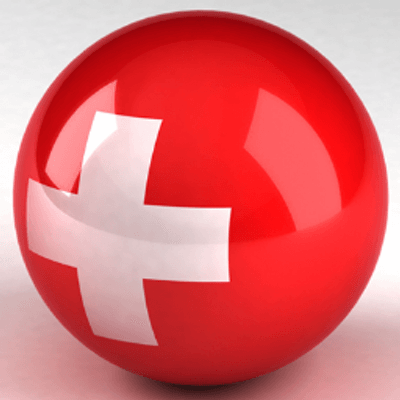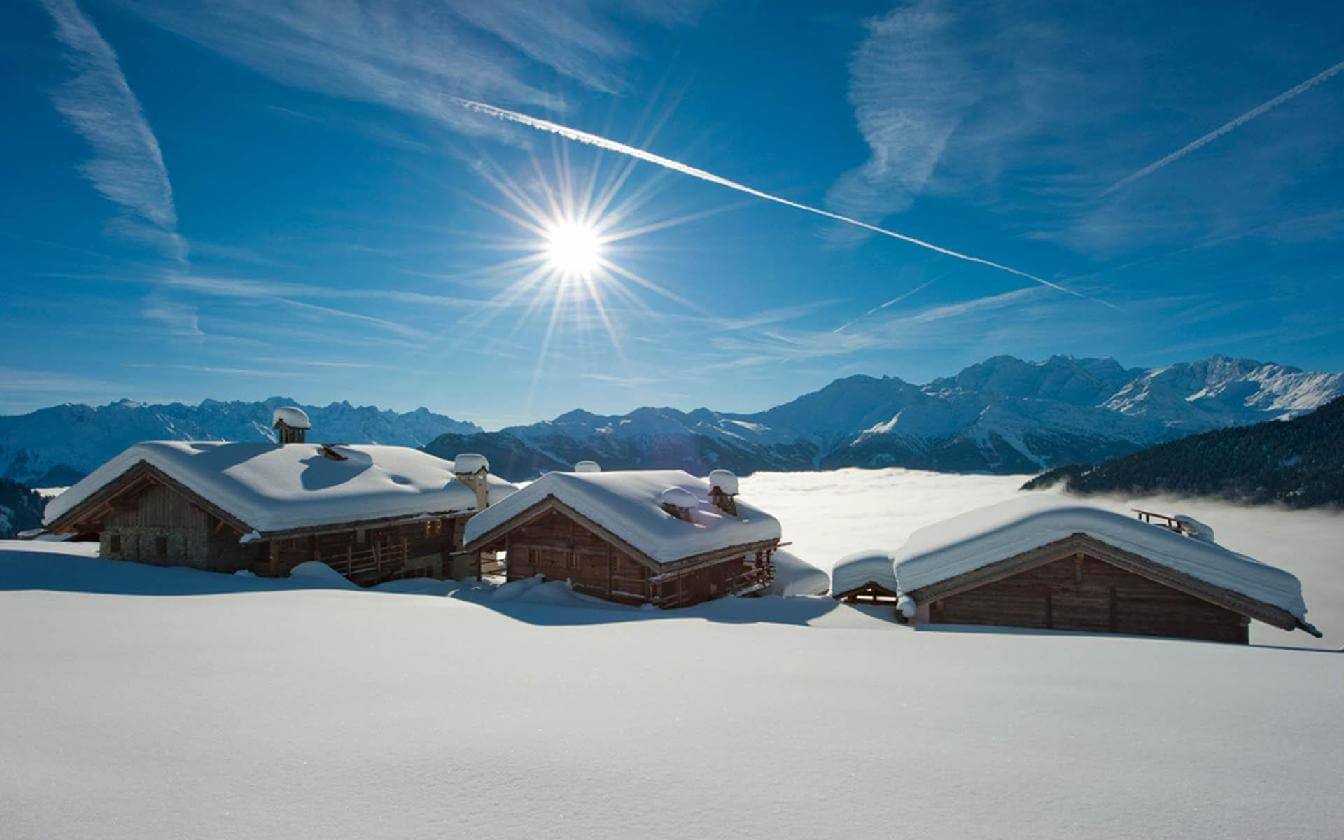Switzerland Basics for Tourists

Geography
Switzerland is located in west-central Europe and covers an area of 15,940 sq miles (41,285 sq km). Its official title is the 'SwissConfederation' (German Schweiz; French Suisse; Italian Svizzera).
It shares its borders with Germany in the north, Austria and Liechtenstein in the east, Italy in the south, and the west with France. The capital of Switzerland is Bern, and its largest city is Zurich. Switzerland consists of 26 sovereign cantons and four language areas.
Switzerland has the highest mountains in Europe and is one of the most mountainous countries. The Alps cover more than 70 percent of the Swiss area in the central and southern sections. In the northwest, Swiss is covered by the Jura. Switzerland's highest peak is the 4,634-meter (15,203-foot) Dufourspitze of Monte Rosa, in the Pennine range.
The Rhine and its tributaries form the central river system of Switzerland. Other important rivers are the Ticino, Rhone, and Inn.
Switzerland is famous for its numerous lakes, particularly those in the Alpine region, known for their scenic beauty. The most important are: Lake of Lugano, Lake of Constance, Lake Geneva, and Lake Maggiore (not entirely within Swiss borders). Also, the Lake of Neuchâtel, Lake of Lucerne, and Zürichsee, Brienzersee, and Thunersee are completely within Switzerland.
Population
Switzerland is one of the most densely populated countries globally, with its 7,1 Million inhabitants on 41.284 square km.
The Swiss people are mainly of Nordic, Alpine, and Slavic or Dinaric descent. The major language communities generally define the ethnic composition of Switzerland: French, German, Italian, and Romansh (Rhaeto-Romanic). Ten percent of the population consists of other ethnicities, such as Portuguese, Spanish and Turkish.
Switzerland is unevenly distributed, with the principal concentrations occurring in the Swiss plateau. Some 62 percent of the population is urban, but most live in small towns. Population growth is slow, and a surplus of jobs means that foreign laborers and their families make up nearly one-fifth of the population.
Regarding religious allegiances, 46% of Swiss people are Roman Catholic, 40% are Protestant, and 2% are Muslim. 10% of the population belong to other religious groups, and 2% are unaffiliated.
Swiss Climate
The climate in Switzerland is moderate, with no excessive heat, cold, or humidity.
The Alps cause many climatic variations throughout Switzerland. On the northern side of the Alps, you can find a central European climate. There are conditions on the south of the Alps that are quite Mediterranean by nature.
The temperatures move between 18° to 26° on summer days and 2° and 6° on winter days. Of course, the Alps are an exception because you can always expect to have much lower temperatures there.
An especially characterizing weather phenomenon is the foehn. This warm, dry southeasterly falling wind can negatively affect human wellness. In Winter, the brise, a cold, northerly wind, predominates Switzerland.
Swiss History
The origins of the state of Switzerland go back to the year 1291 when the three forest communities Uri, Schwyz, and Unterwalden allied to defend themselves against the power of Habsburg. In the period between 1315 and 1388, they inflicted a series of crushing defeats on the armies of the Dukes of Austria, resulting in several other cantons joining the original three in the Swiss Confederation.
Their location left them well placed to interfere in the interminable power struggles of the period. Their influence was supported by the formidable reputation of their army, one of the most powerful in Europe at the end of the 15th century.
The Reformation led to a division in Swiss society between the followers of the reformer Zwingli, Calvin, and the Catholics. The bitter controversy considerably reduced Swiss influence in Europe, and the Confederation was lucky to survive a series of defeats. The Congress of Vienna restored independence in 1815. Still, the repressive policies of the cantons and the lack of any central power continued to work against political unity or economic growth.
An election in 1848 accepted the federal constitution, marking the transition from a loose alliance of states to today's federal state. Still, until the end of the 19th century, the Federal Government began to be truly effective. However, the cantons continue to enjoy vast powers and do so to this day.
In 1848 the federal assembly was set up to take care of national issues, and Bern was established as the capital. Switzerland then started to focus on social and economic matters. Switzerland developed industries predominantly dependent on highly skilled workers. Railway networks and roads were built, opening up previously inaccessible Alpine regions and helping the tourism development. The international Red Cross was founded in 1863 in Geneva, and the government introduced compulsory free education.
Switzerland is a classic example of federalism. The 26 sovereign cantons and half-cantons each have their own respective constitution and laws, even though they are dependent on those of the Confederation.
Afraid that its neutrality, proclaimed in 1516, would be compromised, Switzerland declined to become a member of the United Nations or NATO. It did, however, join the EFTA (the European Free Trade Association). Still, it didn't join the European Union because the citizens rejected this in a referendum in December 1992.
Swiss Culture
Swiss culture has contributed notably to art, literature, and music. It is an amalgam of the French, Italian and German cultures embodied in the Swiss linguistic regions.
From early times Switzerland has been exposed to many foreign influences. As early as the Middle Ages, the country had achieved a high cultural level. Carolingian culture flourished, particularly painting and Romanesque architecture, and the Sankt Gallen (St.-Gall) monastery was a brilliant center of Western civilization. Since then, most European cultural trends, such as humanism and the Reformation, have been assimilated. In the 16th century, John Calvin and Huldreich Zwingli had an enormous impact on their country's culture. By the 18th century, however, Swiss culture had become increasingly internationalized.
In contemporary Switzerland theater and music flourish. The Stadttheater Basel, Stadttheater Bern, Grand Théâtre de Genève, Théâtre de la Comédie in Geneva, and Théâtre Municipal de Lausanne are the leading centers of drama; and in the world of music the Opernhaus Zürich, the municipal opera house, is particularly well known.
Literature
Swiss literature comprises Latin-Swiss literature and the more important German-Swiss and French-Swiss works, closely linked to neighboring countries. The most crucial Swiss literature is in German, beginning with the poetry of the minnesingers of the Middle Ages and including the popular ballads and chronicles dating from the 14th to the 18th century.
The most famous 'local' author is the naturalized Swiss writer Hermann Hesse. A copy of his novel Siddartha was in the backpack of every questing Westerner heading on the hippy trail to India. German-Swiss novelist and dramatist Max Frisch was one of the most respected authors in 1950s Europe. His best-selling 1957 novel Homo Faber was filmed in 1991 by Volker Schlondorff and released under the title Voyager.
The most outstanding German-Swiss authors include Gottfried Keller, Conrad Ferdinand Meyer, Carl Spitteler, Jeremias Gotthelf and Friedrich Dürrenmatt. One of the best-known French-Swiss authors is Charles Ferdinand Ramuz. The most famous children's book, 'Heidi', was written by Johanna Spyri.
Music
The Swiss composers Ludwig Senfl and Heinrich Loris, called Henricus Glareanus, made significant contributions to European music during the Renaissance. Influential Swiss composers in recent years have included Ernest Bloch, Othmar Schoeck, Frank Martin, Ernst Levy, and Conrad Beck. The Swiss conductor Ernest Ansermet gained worldwide fame as conductor of the Orchestre de la Suisse Romande, based in Geneva. The Swiss are also noted for developing the yodel, the art of wordless singing with abrupt shifts in pitch.
Art
Many Swiss artists have achieved international recognition over the centuries. Among them are the painters Conrad Witz, Henry Fuseli, Arnold Böcklin, Ferdinand Hodler, and Paul Klee. The sculptor Alberto Giacometti and the architect Le Corbusier are world-renowned.
Swiss Economy
Switzerland has a typical West European mixed economy. Gross domestic product in 1998 totaled $263.6 billion. It has a highly developed industrialized economy and one of the highest living standards in the world.
Switzerland is very short on resources which means that almost everything must be imported. It is thus not surprising that Switzerland's economic success does not depend on primary production or the industry.
The service sector is the Swiss economy's dominant sector, including trade, financial activities, government, and other services accounting for 68% of employment. In manufacturing, the machinery and equipment industry specializes in precision and advanced technology products: machine tools, printing and photographic equipment, electronic control, and medical equipment. There is also a substantial chemical industry, employing 10% of the workforce, which continues to experience steady growth. The processed foods industry is well known internationally, particularly in chocolate, cheese, and baby foods.
Banking is one of the most critical businesses in Switzerland. The semiprivate Swiss National Bank is the bank of issue, in which shares are held by the cantons, other banks, and the public. Switzerland is a major international financial center; international depositors and financiers favor its banks because of Swiss political and economic stability and traditional secrecy in banking transactions. Private banking is one of the country's principal sources of income. Zurich is the country's main banking center; leading commercial banks are the Union Bank of Switzerland, the Swiss Bank Corporation, and the Swiss Credit Bank. The Zurich Stock Exchange is one of the most important in Europe, and the city is also a major trade center for gold.
In recent years, however, the government has come under intense international pressure to allow disclosure in the course of criminal and other investigations. Switzerland is still considered a safe haven for investors because it has maintained a degree of bank secrecy and has kept up the franc's long-term external value.
Switzerland is not a member of the European Union. However, nearly two-thirds of its exports are sold to EU countries. It is not likely it will join the EU in the near future, as a recent referendum rejected membership of the European Economic Area - a body created to reduce the economic barriers between the EU and the EFTA (European Free Trade Association), to which Switzerland does belong.
Switzerland's main export markets are Germany, France, Italy, and the UK.
Currency
The unit of Swiss currency is the Swiss franc (CHF) which is called 'Schweizerfranken' or just 'Franken'. It is divided into 100 c - centimes (or Rappen in German areas). There are notes for 10, 20, 50, 100, 200, and 1000 francs and coins for 5, 10, 20, and 50 centimes and 1, 2, and 5 francs.
Credit Cards
The usual credit cards like American Express, Eurocard, Mastercard, Diners Club, or Visa are widely accepted. However, credit cards are not as commonly accepted in Switzerland as, for example, in the US. It is always wise to use them whenever possible because credit-card exchange rates are the most favorable.
Eurocheques are accepted up to a value of 300 CHF.
Traveler's cheques are accepted at airports, railway stations, and banks. To avoid additional exchange rate charges, travelers should take their traveler's cheques in Swiss Francs.
Swiss Shopping
Shops in Switzerland in general open from 8 am to 12:30 pm and from 1:30 to 6:30 pm on weekdays. On Saturday they usually close at 4 pm. A unique thing about Shops in Switzerland is that most are close on Monday mornings. Some cities offer something that is called late-night shopping on certain weekdays.
Automobile and car Rental
Most important: Traffic drives on the right.
The minimum driving age in Switzerland is 18.
A valid national driver's license is sufficient. Green Card insurance is advised - ordinary domestic insurance policies are valid but do not provide full coverage.
Seatbelts are obligatory, and children under 12 years must travel in the back of the car.
Dipped headlights are compulsory in a bad light.
The permissible alcohol limit in Switzerland lies at 0,8 ‰. Drink driving fines are very high.
In Switzerland, you will find an extensive network of well-maintained roads. Many mountain roads are narrow and winding, often closed in heavy winter conditions. Otherwise, chains and snow tires may be necessary.
Car Hire
All major European companies are represented in Switzerland. Car rental is available in all towns, from hotels, airports, and crewed rail stations.
The Road Toll
For the use of the national roads, motorways an annual road tax, called 'Vignette', of 40 Swiss Francs is needed for all cars and motorbikes. An additional fee of 40 Swiss Francs is applicable to caravans and trailers.
The Vignette has to be visibly stuck to the windshield. It is available at all border crossings and Swiss post offices. It is valid for multiple re-entries into Switzerland within the duration of the licensed period. Cars rented in Switzerland usually include the Vignette.
Current Speed Limits
On motorways 120 km/h, on major roads outside urban areas 80 km/h, in cities and villages 50 km/h and in inner-city usually 30 km/h.
Telephone
Switzerland International Code: 41
Bern Area Code: 031
Public telephones are widespread, and they accept 10c, 20c, 50c, CHF 1, and CHF 5 coins. The minimum amount for public phones is CHF 0,60. Most public phones also work with Telephone cards available at railway stations, post offices, and newsagents.
You can make international calls from most public telephones; otherwise, most large post offices have booths. If you dial 114, you'll get an international operator or dial 00 followed by the relevant country code and number.
Mobile Phone
Except for remote mountainous areas, an extensive mobile telephone network exists.
Electricity
The current is 220V AC, 50 Hz. Most plugs have two round pins.
US Visitors should consider bringing a plug adapter and a transformer to operate personal small electronic items.
Language
There are four official languages in Switzerland: French, German, Italian, and Romansch. Swiss-German is spoken by nearly 65% of the population, French by circa 19%, Italian by 8%, and the fourth national language, Romansch, is spoken by less than 1%. There also are other languages spoken by nearly 10%, including Spanish, Portuguese, and Turkish.
Swiss German is also called Schwyzertütsch. It is an Alemannic dialect of German differing vastly from written German and other German dialects. However, newspapers and magazines are written in standard German. German is the language of many theatres, motion picture, and television productions.
French is the most commonly spoken language in the cantons of Fribourg, Jura, Vaud, Valais, Neuchâtel, and Geneva. At the same time, Italian is the predominant language in Ticino.
Swiss Holidays
| Holidays celebrated in Switzerland | |
| 1st January changing changing 1st May early May, changing late May, changing 1st Aug 25th December 26th December | New Year's Day Good Friday Easter Monday Labour Day Ascension Day Whit Monday National Day Christmas Day Boxing Day |
| Partly celebrated Holidays in Switzerland | |
| 2nd January 6th January 8th March 16th April 22th June 15th August 1st November | Berchtoldsday Epiphany Ash Wednesday Palm Sunday Corpus Christi Assumption All Saints' Day |


